Editor’s Note: This story was originally published in The Nostalgia Issue of Life & Thyme.
———
Martin Luther King, Jr. Day Weekend, 2016
Telling a story about Detroit cannot simply rely on a landscape pieced together from memory. If it was, you could easily touch on urban blight and talk about nature reclaiming empty buildings. If weather permits, you could see exactly what “blight” refers to, but this is a January story—and January in Detroit is a time for snow and wind. When you’re in snowy Detroit and you already know the Detroit narrative, you might be inclined to talk about how the worst aspects of the economic collapse have damaged the city. You remember that when people say Detroit was a “once great city,” they are nostalgic about its past magnitude. Nostalgia is tricky in that way.
The Detroit story people on the outside of the city know is based on remembering what used to be—a grand, important and thriving metropolis. You might remember other things about Detroit—important things—like Hitsville, U.S.A. and Motown. You remember that you heard Thelma Houston’s “Don’t Leave Me This Way” in an Art Deco restaurant in Midtown so pure and untouched by time it made you forget it’s five-degrees outside. You remember how you read that decades ago, Martin Luther King Jr. led the Detroit March to Freedom down the nearby Woodward Avenue. You remember why this weekend is an important holiday. You remember that to tell a Detroit story, you must start with the reason for your visit—an event.
So how do you tell a story about an event in Detroit without focusing on the landscape? To tell this Detroit story, you need life; and when signs of life are not obvious, you have to venture inside an unassuming building. Within the bleached stone façade of the Jam Handy, a former film studio on East Grand Boulevard, there is congregation by way of Detroit Soup. This is an event, a community gathering and fundraiser based around a humble meal. To tell the story, you talk to a great deal of Detroiters who love the city and want to do good by it. They are where you find the story, the one about people creating newness; it’s a powerful memory to work from.
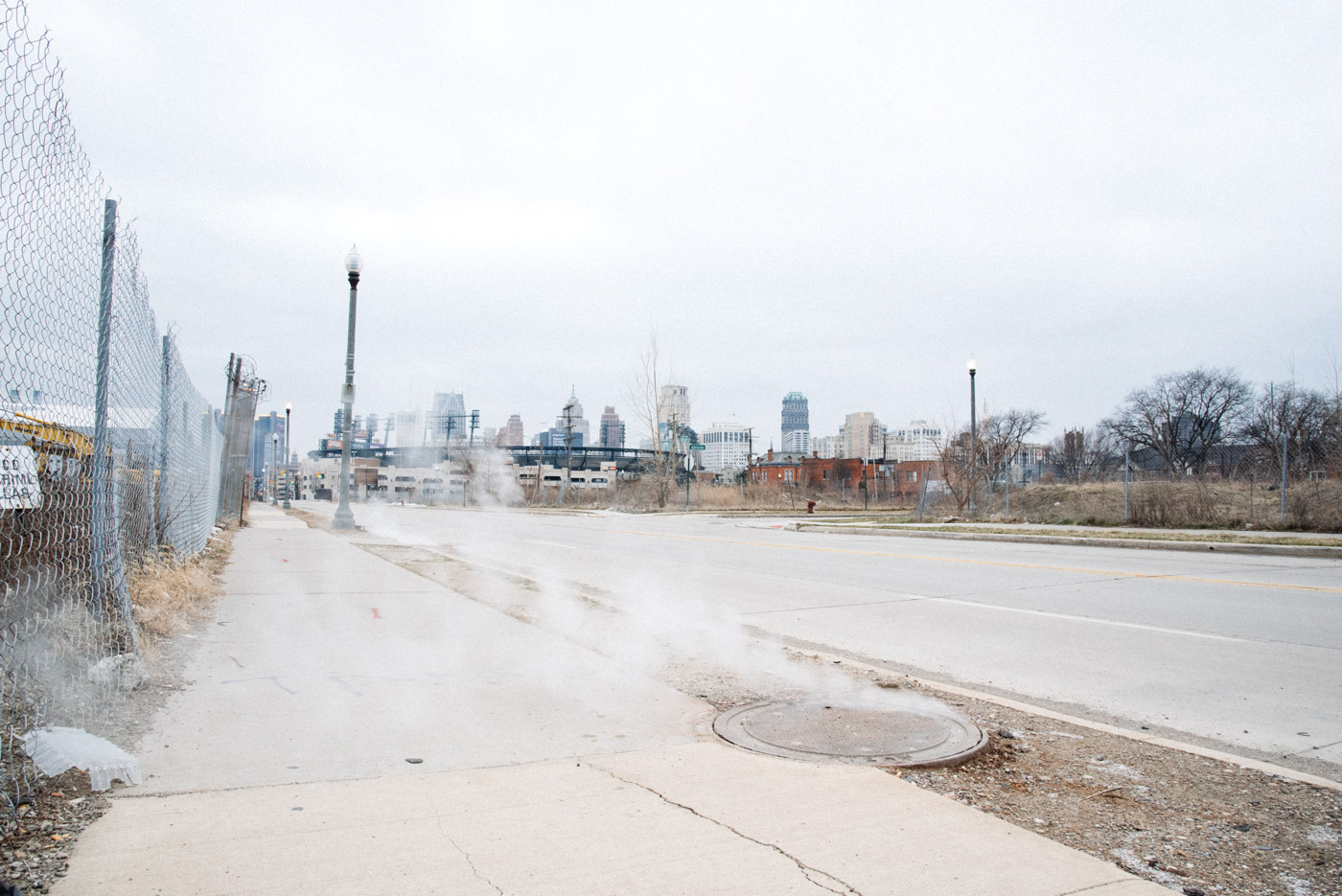
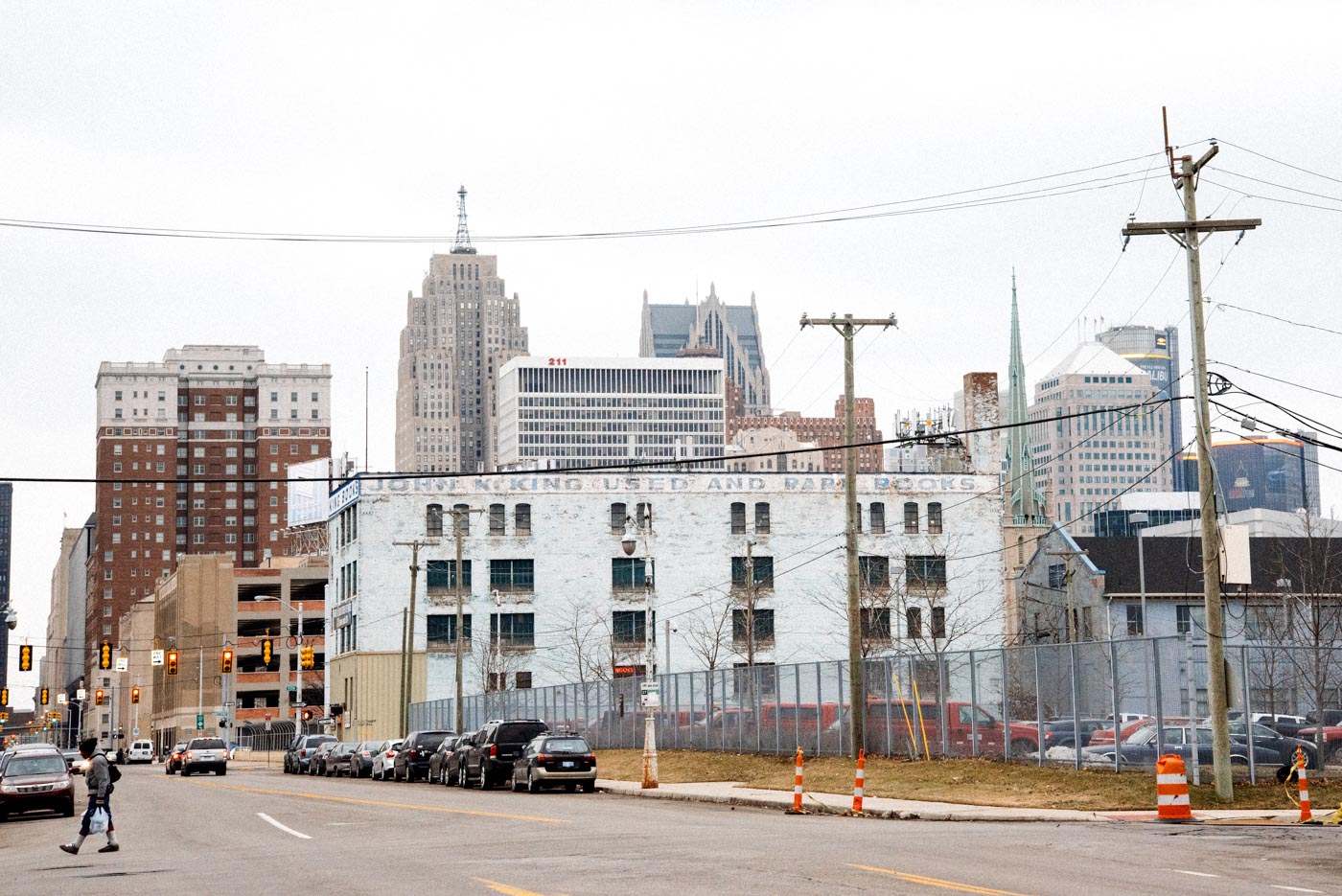
___
Detroit Soup is a community action organization that hosts a public dinner to raise money for a social cause. They do this because they love the city; they know ideas for positive change exist, and people need a platform to present their ideas. The minds behind the program know many Detroiters need money to help fund their projects, so Soup helps raise that money with a dinner. At a Soup meal, four people representing nonprofit organizations to leadership programs, describe how a problem in Detroit can be solved with their project. One presenter might have a plan to plant an urban farm; the farmer must demonstrate to the audience that the money raised will be utilized accordingly. When Soup comes to an end, one of the presenters leaves with a few thousand dollars to use on his or her project. Detroit Soup is the city’s own citizens using their money to help Detroit.
While congregation tends to have more religious inclinations, the act of gathering is itself a ritual. Rituals can find their roots in the simplest places—even in eating. Detroit Soup operates on this basic principle of openness through commonality. A bowl of soup, as Amy Kaherl puts it, is universal.
Kaherl is the force driving Detroit Soup’s success. If Detroit Soup was an actual congregation, Kaherl would be its minister. However, as Soup’s executive director, Kaherl likes to work behind the scenes, preferring the event and the support it offers to be its own talking point. Humbleness aside, what Kaherl brought to Detroit in 2010 was an idea for action.
“We all know what the fucking problem is,” Kaherl says. “At Soup, there are four actionable outcomes that can impact the community. It’s the new town hall. Instead of bitching about it, these folks are offering four solutions.”
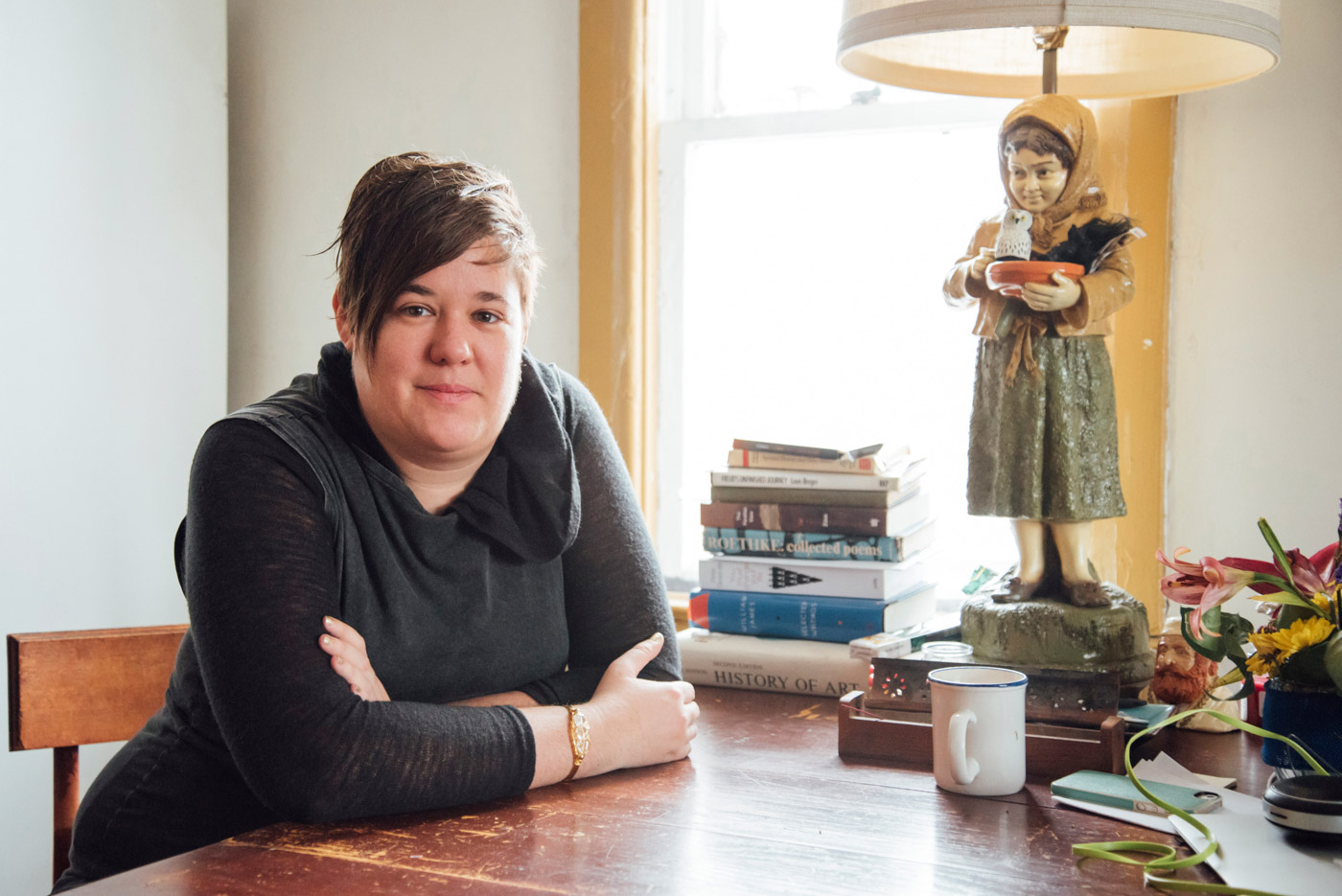
Detroit Soup is perhaps a spiritual successor to the parlor meeting, but there are no frills or hors d’oeuvres. Participants and observers come with only the basics—themselves and their appetites. People come to connect, to discuss and to support a venture that tackles community issues when infrastructure and local government have failed. While the term “crowdfunding” has more or less become ubiquitous with the digital age, Detroit Soup is the offline, real world version that gives an entrepreneur or community activist a much needed cash injection.
The setup of a Detroit Soup is fairly straightforward: the community will gather and donate their money to a collective fund. They eat together, and then vote on who to give this money to. After six years, 125 dinners, and tens of thousands of dollars raised, Detroit Soup has spread into a vast network. There are multiple “neighborhood” Soups in different areas of Detroit Metro. There is also a City Wide Soup held at the Jam Handy roughly once a quarter. The City Wide tends to be the biggest of the events.
The lack of pageantry at a Detroit Soup means two things are guaranteed: first, if you go to an event, you will meet people because you have hours to talk and move around. Second, the voting does not become convoluted. There are no eye-catching presentations—just a person or two, a microphone, and the crowd they are addressing. Participants vote by circling a presenter and depositing the slip in a small box. The presenter who received the most votes, wins. There is something purely democratic about this process.
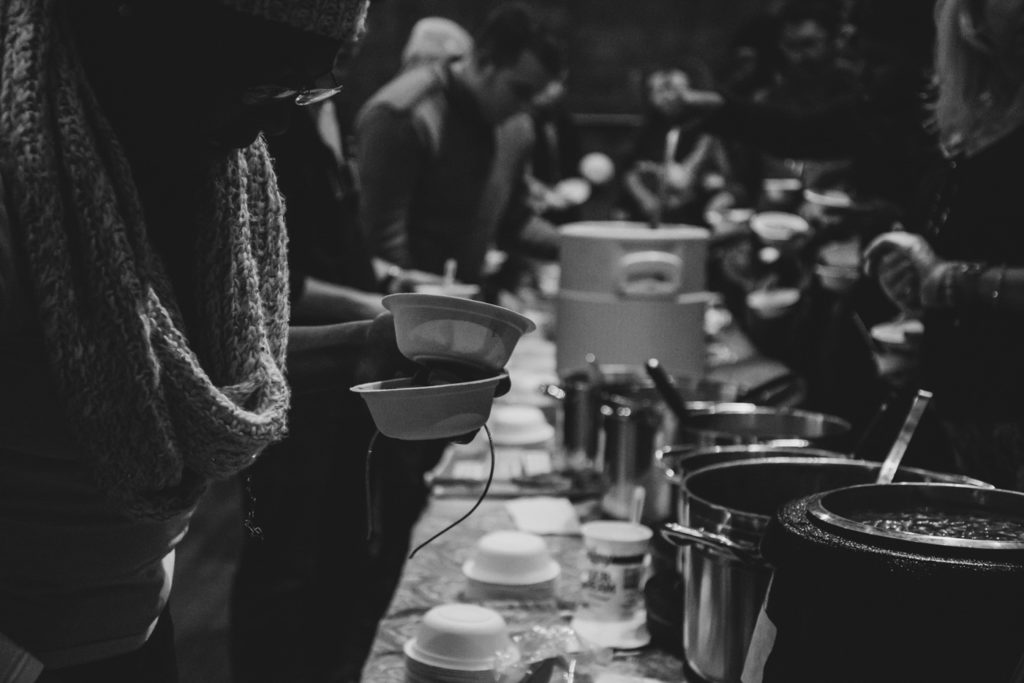
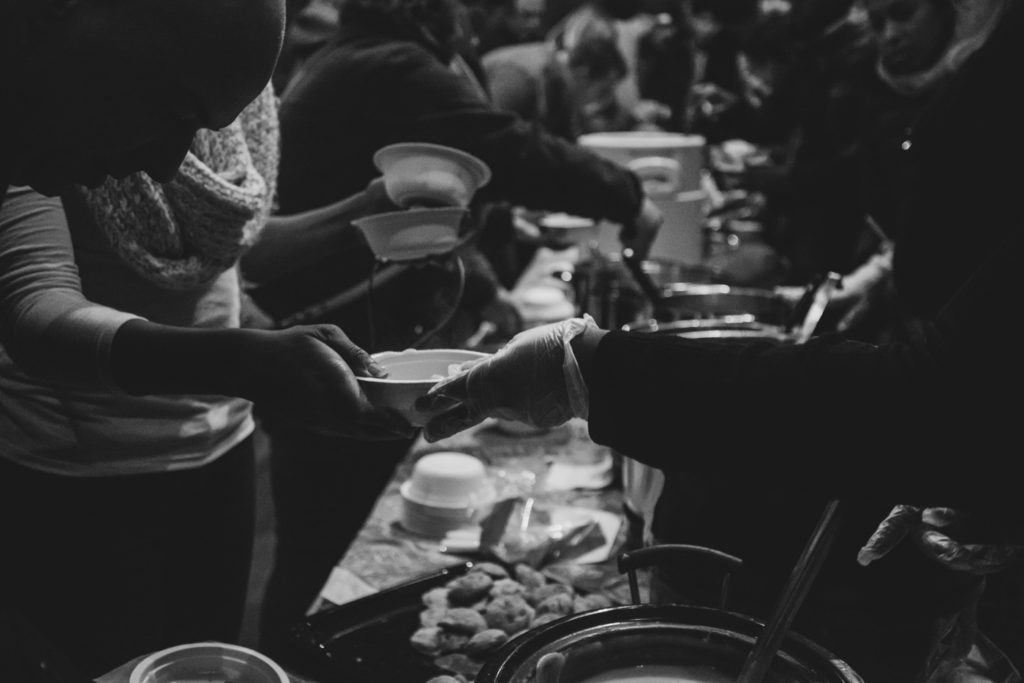
___
Even on Soup’s off days, Kaherl is not far from the Jam Handy. Kaherl lives in a cozy, if unassuming home within walking distance of the shared event space. She extends an invitation into her house, a gesture consistent with the truth that Detroiters are a kind group. Kaherl has played a part in revitalizing this house and the Jam Handy building with the basics. It’s a Midwest thing, Kaherl says, no need to be flashy. Instead, Detroit folks think in terms of utility; make sure the house is cozy and the space safe and accessible for everyone who comes.
“There’s something so healing about gathering for a meal and having a safe space for conversation,” Kaherl says. “The way we do Soup is sectorless.”
Inside, we sit on comfortable chairs, surrounded by a library of records. There is something about her demeanor that lends to being accepted and to feeling welcomed. This something might go back to her time in Fuller Seminary School, with a goal of becoming a youth pastor. Upon returning to Detroit, Kaherl set this goal aside; but her convictions of community healing thrived. “I think I got here at the tipping point of Detroit,” Kaherl says. She met a network of artists, musicians, restaurateurs—Detroiters who wanted to create something with the time and space at hand. “I did this event to raise money for women in art,” she says. “And that’s how Soup got started.’
The concept behind Soup is similar to early iterations of the Christian church and the concept of gathering for a meal, but there are no religious affiliations or requirements. As Kaherl explains, while Soup operates on the basic tenets of religious faith, everyone is welcome. “As humans, we doubt ourselves and hate ourselves, and our lives are plagued with, ‘What if? What if I’m not good enough?’” she says. “Soup allows you to be good enough.”
Not being from Detroit, it seems solving any problem that affects this massive city seems unattainable. “The one thing Detroit has is time,” Kaherl says. “It was already broken before the recession; it was already bankrupt before the bankruptcy. The city just wasn’t running.”
Yet that is exactly why Detroiters attend Detroit Soup. She wants Soup to be a place where people feel safe, where they can share ideas and ask questions. “About 75-percent of the diners tonight will be new,” Kaherl says. “We’ve been here. We were just trying to do the right thing. We’ve earned the trust of Detroiters, and trust is the most important.”
But would Soup be possible without the dining aspect? “Soup is so universal,” Kaherl says. “Every culture has a soup. Even when I was in Kathmandu I was eating soup. Soup is inviting and you know how to eat it, it’s easy to make, and it’s inexpensive. There’s something about food that makes it easy to have a conversation. It’s safe. I go back to the word safe because we don’t feel safe in our culture. You’re able to figure out how to be safe here when you’re eating.”
Eating allows for guests to cross cultural boundaries. One might think the idea of “breaking bread” at the communal table, which in itself has Biblical connotations. You could point to the origins of this term in the book of Acts. Or you could leap forward many years and think of this term played out for Martin Luther King Jr. This is his holiday weekend, after all. But as Kaherl points out, the ritual act of dining allows for a very human form of spirituality.
“When you sit around and eat,” Kaherl says, “there is a sign when the meal is done. But you don’t have to leave the table. You don’t have to get up and go. You sit and have a conversation because you’re sharing some part of who you are and what you do. It’s really special.”
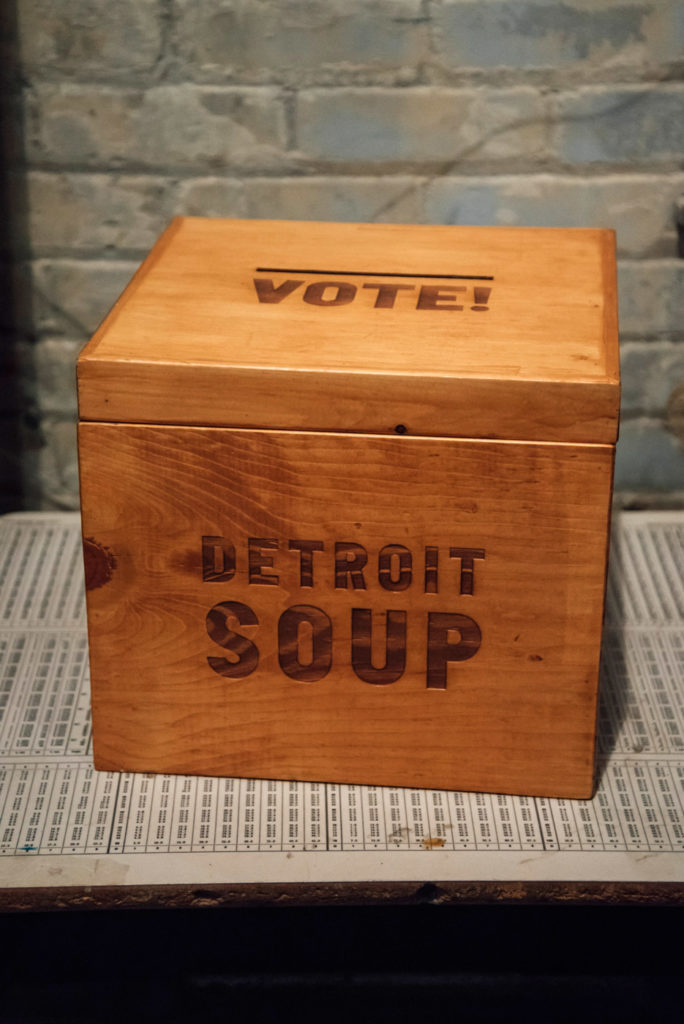
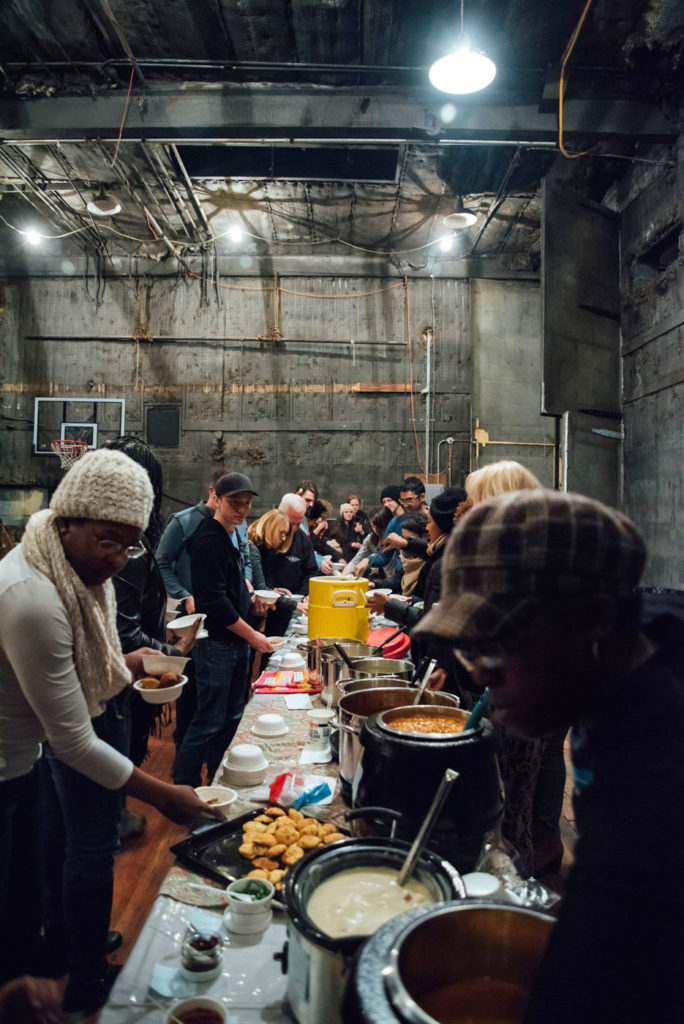

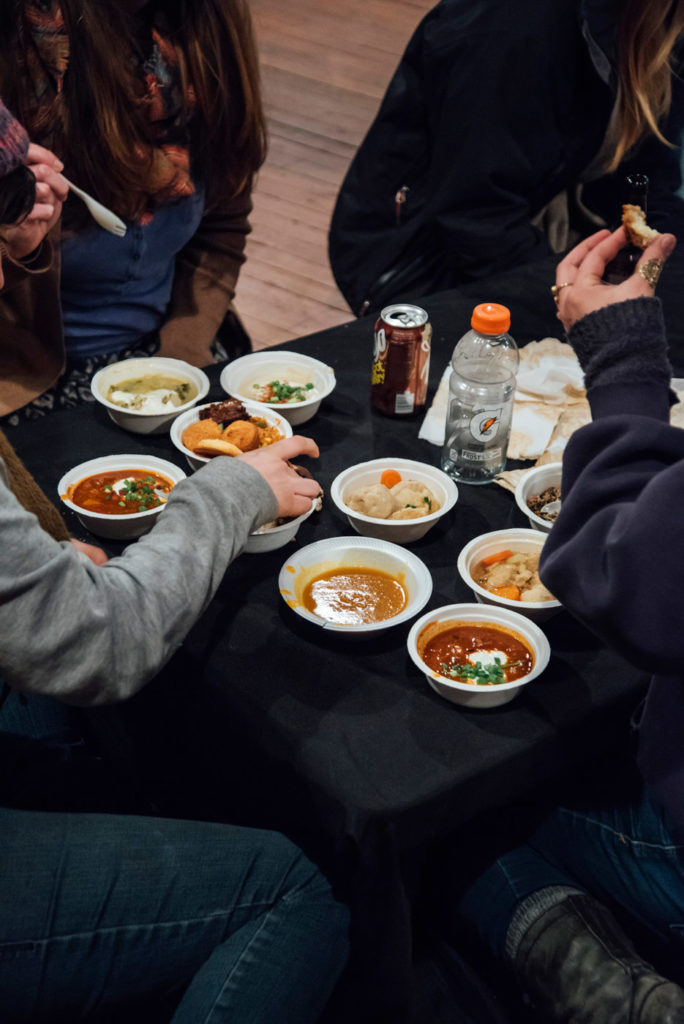
___
Out on quiet, windswept East Grand Boulevard, it is 10-degrees and snowing. The Jam Handy is now lit up. On the sidewalk leading to the entranceway, there is a wood sign that says Detroit Soup. Passing through the double doors, guests are greeted by warmth. It’s not just the heater, but the sensation of roughly 400 people assembling on the bare wood floors of the former film studio.
A Nas song plays; Kaherl, come to find, loves hip hop. The music is just low enough to hear the vibrant murmur of these roughly 400 people in deep conversation. There are not groups, but simply one large conversation that reaches wall to wall. It is as if everyone is in conversation with each other.
In the middle, people sit around small tables. The exposed brick and concrete walls are unadorned; there are no visible banners or insignia, no iconography. What you see is people. There is little online presence. Instead, one might come across a flier posted across the city. Chances are, Detroiters will know someone who has gone to Soup. They will hear a story about a great new initiative that was funded at Soup. Someone they know is now volunteering with an organization they saw present at Soup. All of these movements lead back to Kaherl’s efforts.
Because this is a City Wide Soup, Kaherl expects a larger crowd. Whether by chance or consequence, it’s held on Martin Luther King Jr. Day weekend. There is an important connection between the brevity of the gathering and the greater social implications of the holiday. With King, there is the inevitable conversation about race and race relations in the United States. In recent years, the issue of race has been particularly painful; this is especially true in metropolitan areas, Detroit notwithstanding. Yet, in a microcosm, Detroit Soup parallels something Martin Luther King Jr. said in speech at the 1963 Detroit Freedom March: And so this social revolution taking place can be summarized in three little words. They are not big words. One does not need an extensive vocabulary to understand them. They are the words “all,” “here,” and “now.”
“All here now” is a reality within the Jam Handy. Much like the Detroit Freedom Walk, Detroiters willingness to gather for this meal does not require government endorsements. Because food—or the ritual of gathering for a meal—is so universal, and everyone is welcome. The power of a meal transcends differences; this is what makes Detroit Soup so successful.
From the four presenters at this Soup, four very pressing issues were raised. After the presentations, attendees stand to vote and eat. There is something organic in the way everyone assembles. Guests fall in line without inherent direction to do so. One line snakes through another set of high double doors. It leads into another room where the food—including six or seven different kinds of soup—is laid out. There are bowls and spoons. And in the other line, people wait to vote.
“It all starts with one question: Who are you voting for?” Kaherl says. Making way through the line and finding a place to eat your soup, one can learn about the city’s residents, and learn where they think the pressing issues lie, and why they voted the way they did. Discourse is another important facet of this Detroit story—people care about enough their city to come out and try to fix it without prompting, without force.
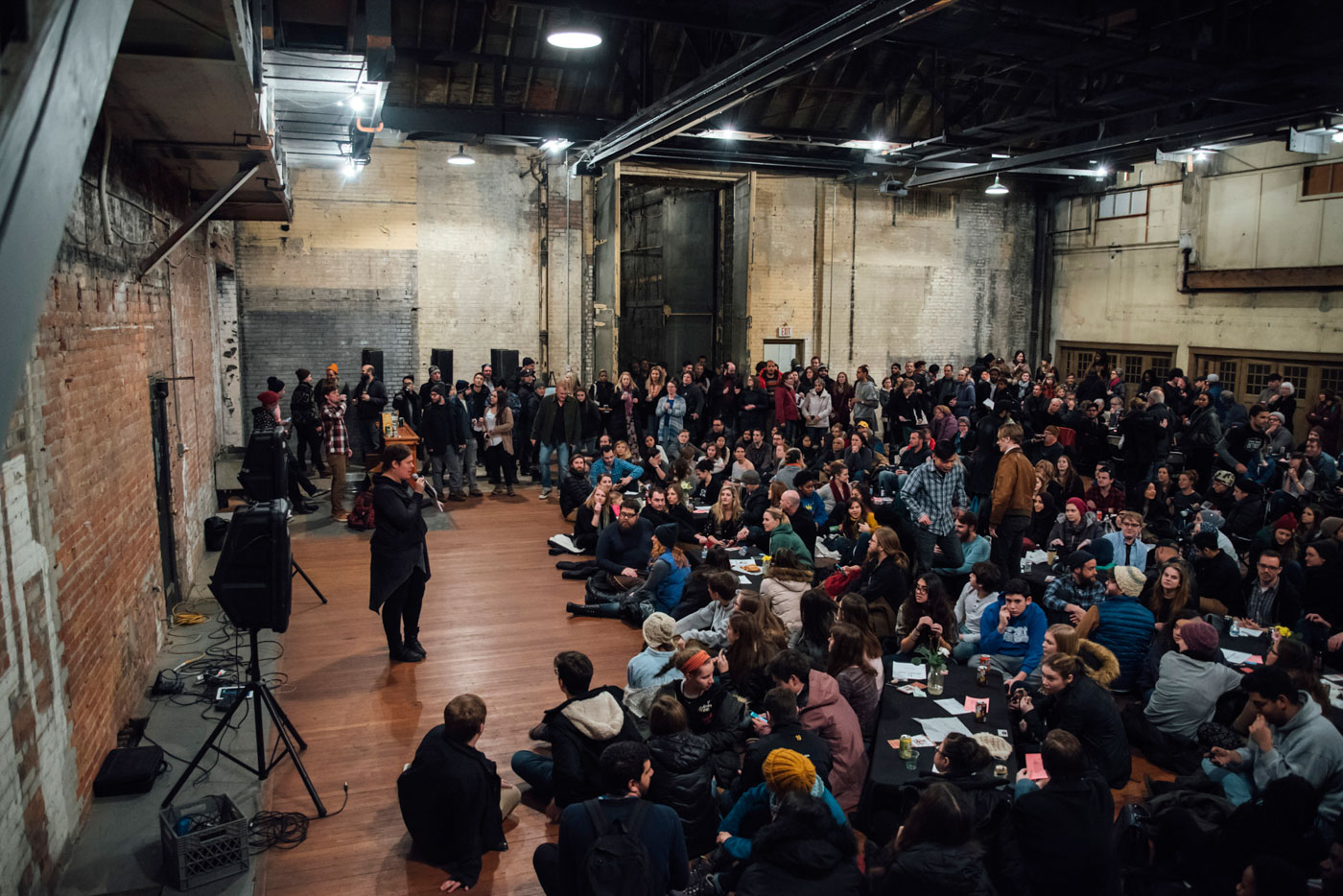
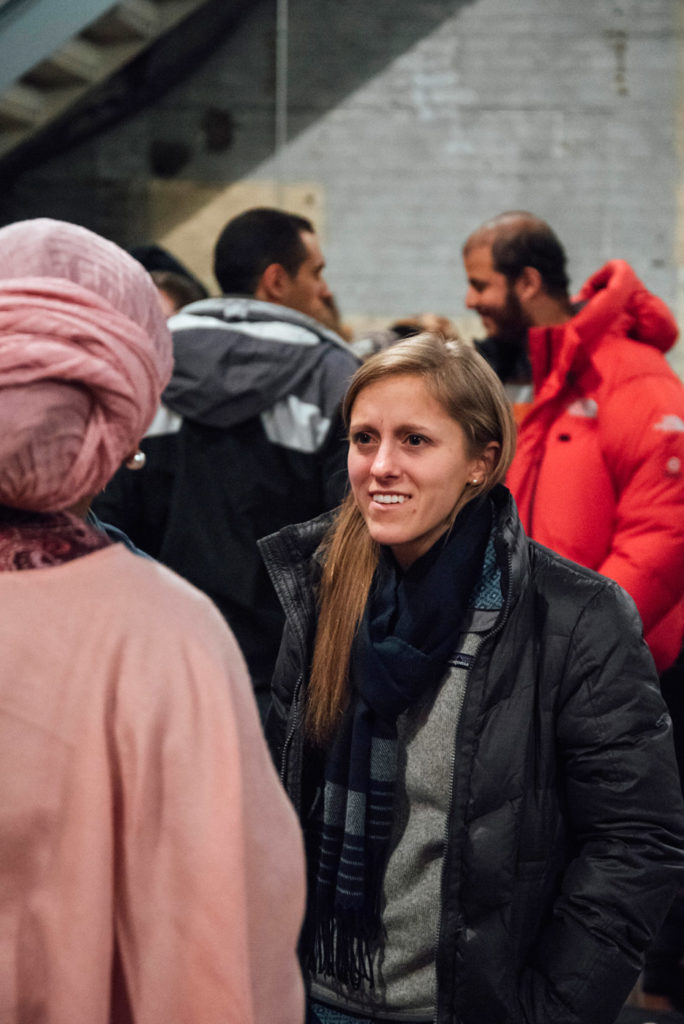
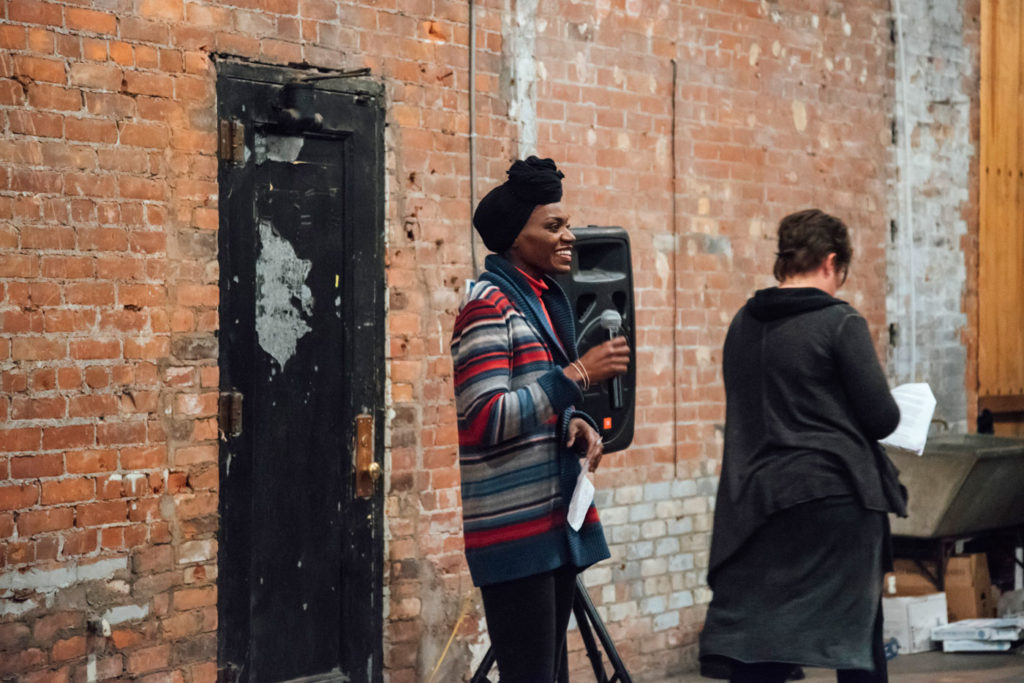
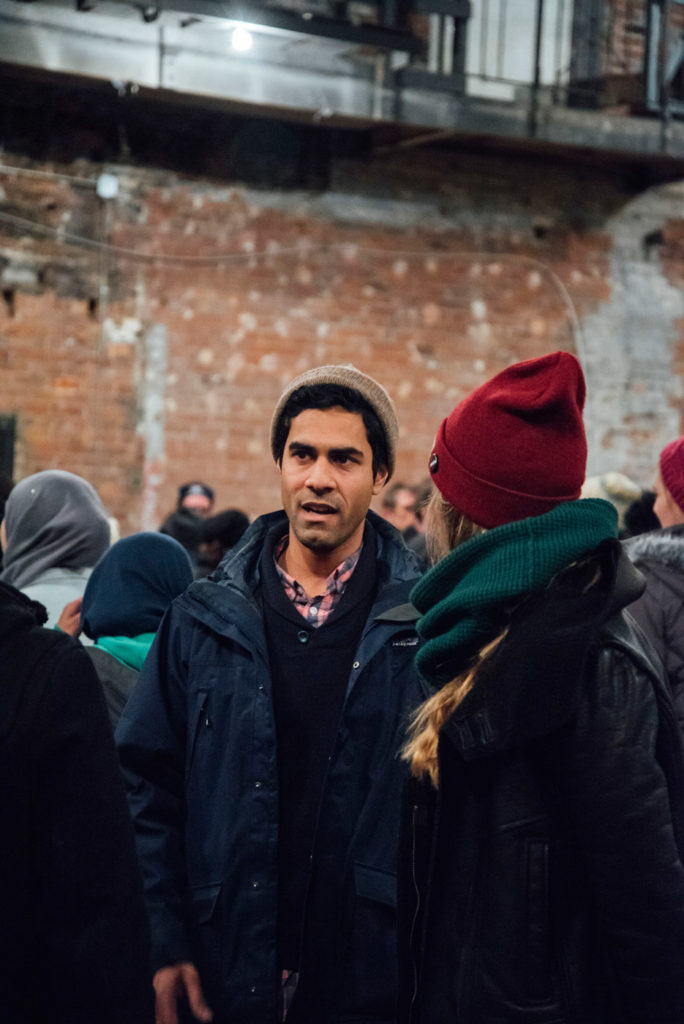
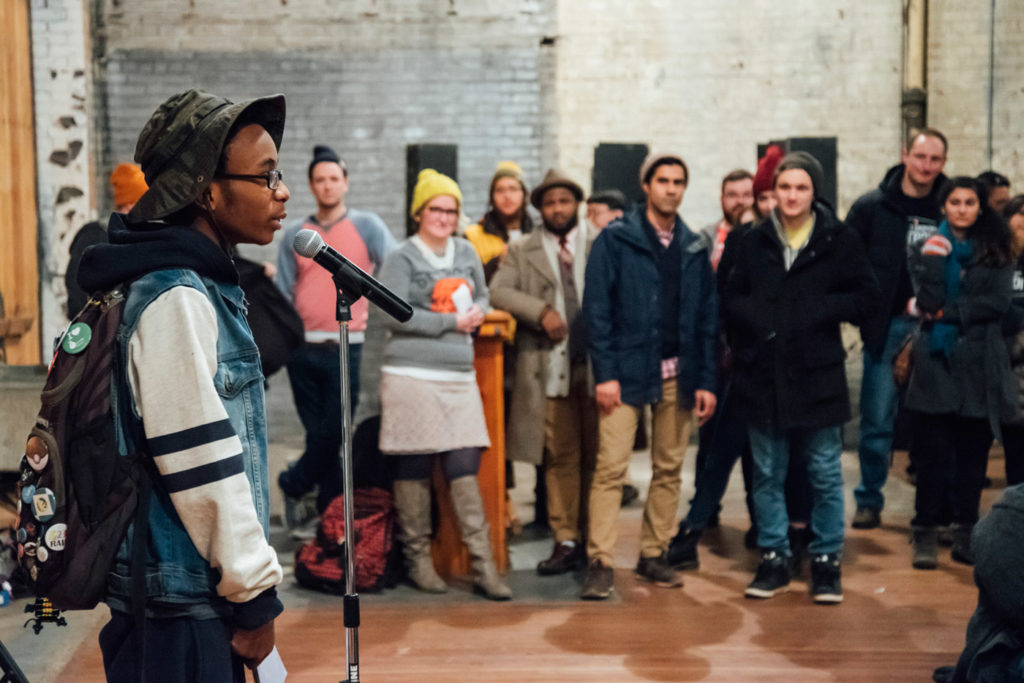
___
The idea of fixing a city in need, especially one that is 138 square miles, seems overwhelming. But as you meet more people in Detroit, it becomes clear there is a want—a need—to fix the city.
Each of the presentations stressed an indispensable fact: fixing any of the city’s problem takes so much work. From the young woman setting up showers for the city’s 17,000 homeless men and women, to the students running a mobile check-up clinic, there’s evidence of the severity of Detroit’s problems.
Detroit can be considered a tough place to live, and Detroiters come to Soup to take on a number of different issues. For instance, 2012 and 2013 winner, Detroit Food Academy, activates youth leadership through culinary arts. The Empowerment Plan, 2010’s winner, tackles issues concerning homelessness. Veronika Scott, executive director of The Empowerment Plan leveraged her winnings to nationwide recognition through an innovative work program. At the shared working space in Detroit’s Corktown neighborhood, Ponyride, Scott employs women who have experienced homelessness to sew and construct sleeping bags.
Perhaps the willingness to take on problems, to roll your sleeves, is rooted deep in the Midwest ethos of hard work. “Bring your work ethic to Detroit,” Kaherl says, “and you’ll always have a job.” This is the city that made America mobile, after all. This is the city that built the car and paved the highways it was driven on. Hard work is both the history and the lifeblood of modern Detroiters.
If the ethos of hard work is the take away from a Detroit story, no better example of this is previous Soup winner Cornetta Lane. Through Core City Stories and Detroit Dialogues, Lane facilitates a neighborhood dialogue rooted in oral histories. “I feel like people forget we have an emotional connection to home and when you rebrand neighborhoods, you’re stripping away the neighborhood’s identity,” Lane says. “So the concept of Core City Stories was to preserve the historical identity of Core City through the art of storytelling.”
It is impossible to ascribe to a singular Detroit identity. As Lane discovered, at the neighborhood level, erasure is a possibility in the plight for a “New Detroit.” For Core City Stories, Lane set up a bike tour through her own neighborhood of Core City—which was on the verge of being rebranded under another name. The name was one that neither Lane, or the other residence had input on. Incidentally, the rebranding was being done by out-of-towners. People come to Detroit to start something new, to use the land and the space, without thought of the lives already there.
“I had been doing all this work in Detroit,” Lane says, “But there were things happening in my own backyard that I really need to pay attention to.”
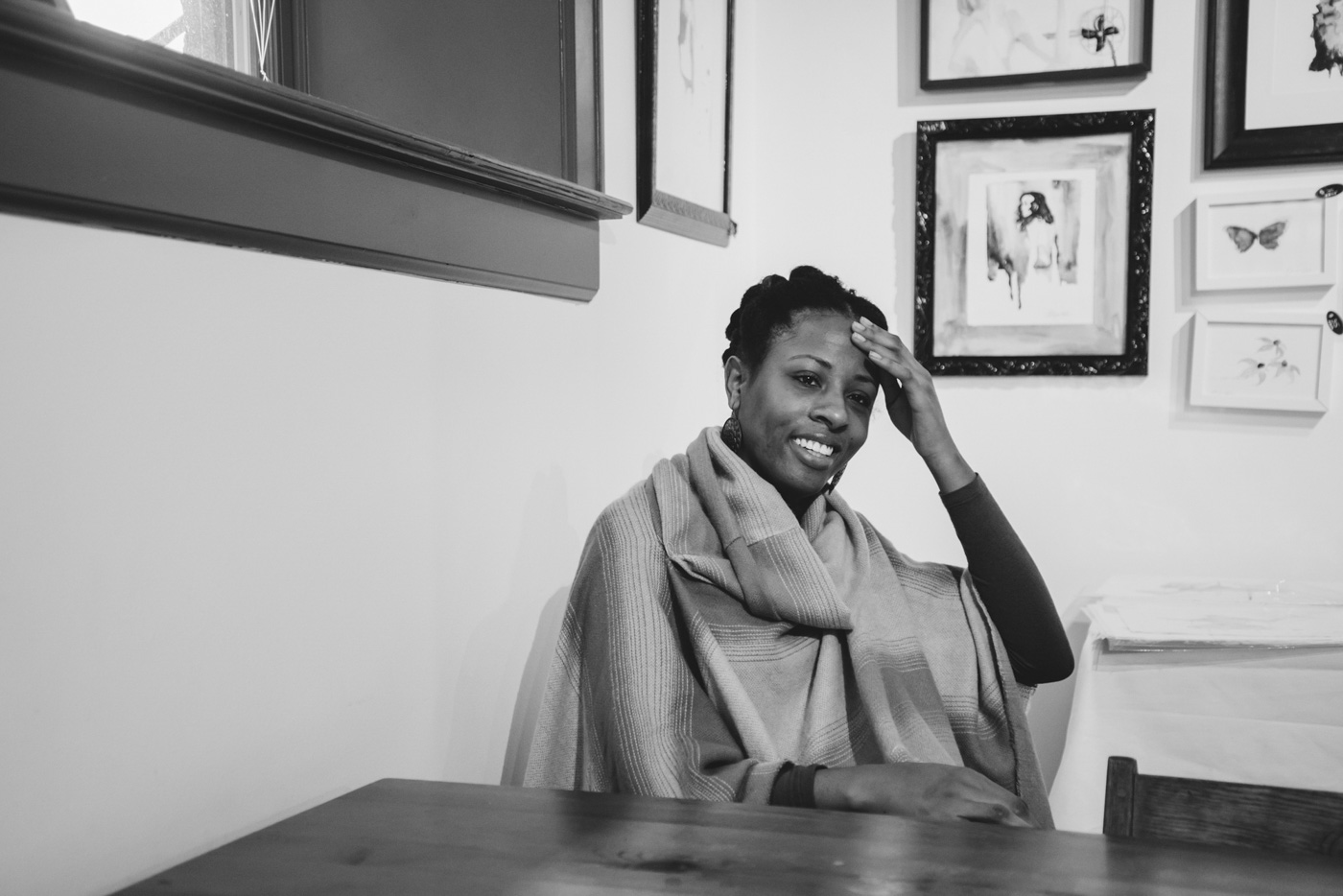
Lane was introduced to Soup through her mentor. “I was floored by the energy in the room. I had never been to an event even though I was born and raised in the city. People were so supportive of each other and I was, ‘Detroit Proud’ in that moment. You had kids who were presenting, grandmothers making soup—it was amazing.”
Lane’s narrative points to the possible ramifications of renewal. It’s rumored that Detroit is becoming a hip city. If people let Detroit, or even a neighborhood slip from their memory, it can cease to exist. At the same time, if they perseverate on what the Detroit once was, it will be difficult to look toward progress. But in seeing the work being done, there is a difference between making a city “cool” and what the people at Detroit Soup are doing. Their care for their city is genuine.
When you part ways with Lane, you remember it is now Monday, and Monday is Martin Luther King Jr. Day. While it is still snowing outside, while there still might be abandoned buildings within the line of sight; rebirth—or something like it—looks possible.
If the “old” Detroit was one of America’s founding cities, and the current Detroit is equal parts broken and breathing, what does the future Detroit look like? It’s something to ponder after a last meal in the city, a last gathering with these wonderful people. In some sense, the experience has been a collection of gatherings, of meals, each a progression of the last. This is where one finds the heart of Detroit, in its people. Nostalgia is tricky in this way.

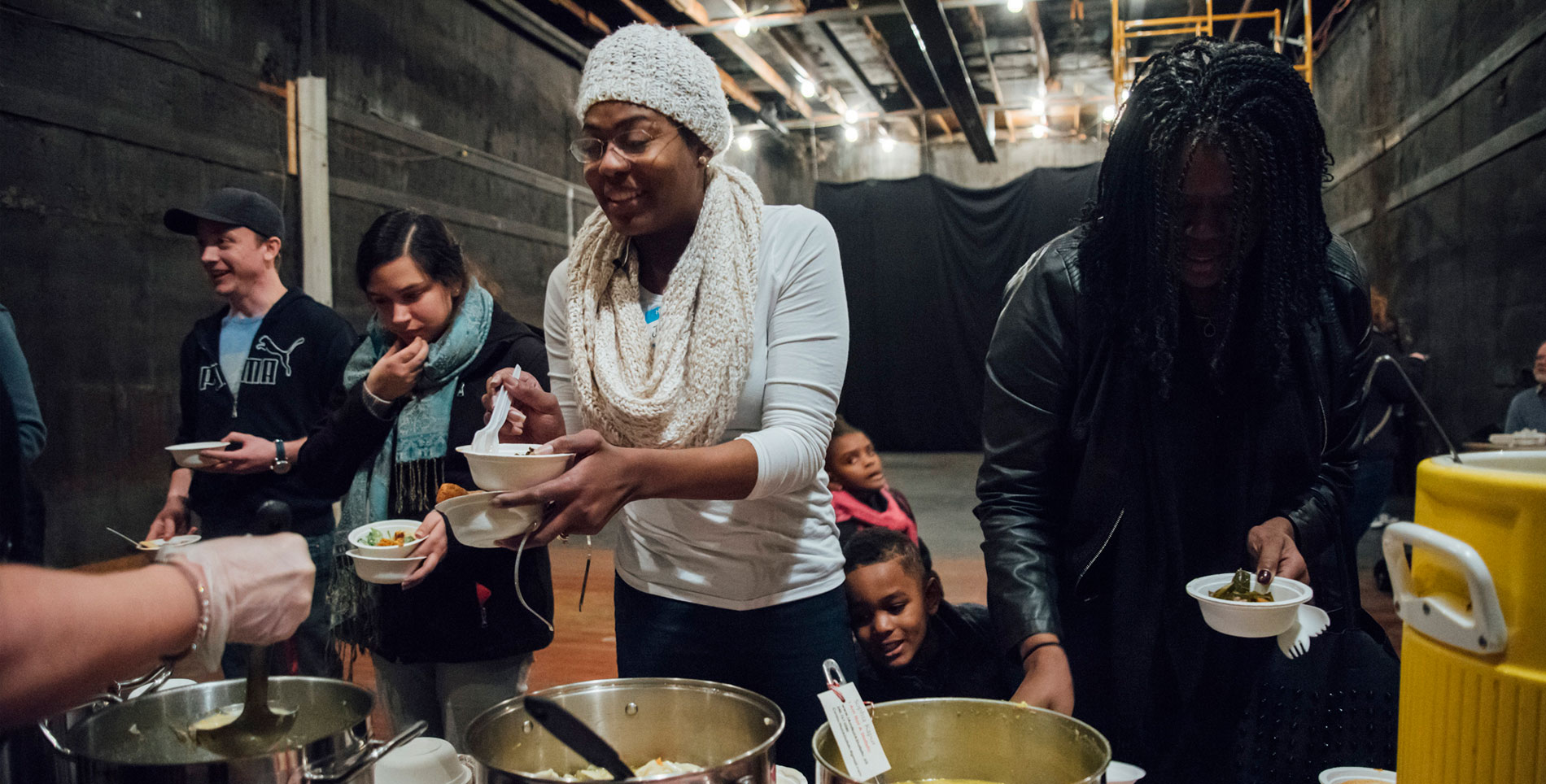

Our comments section is for members only.
Join today to gain exclusive access.